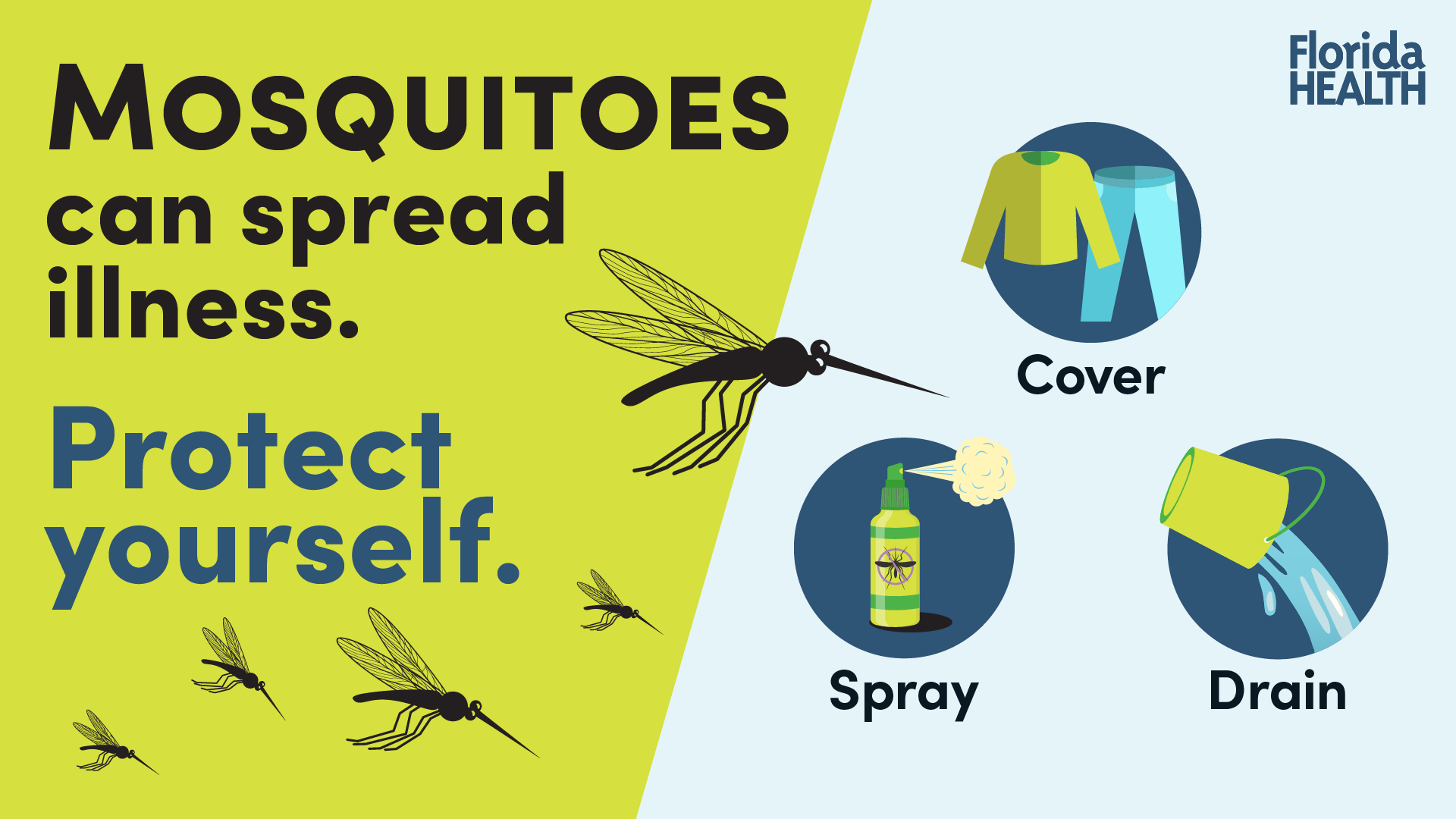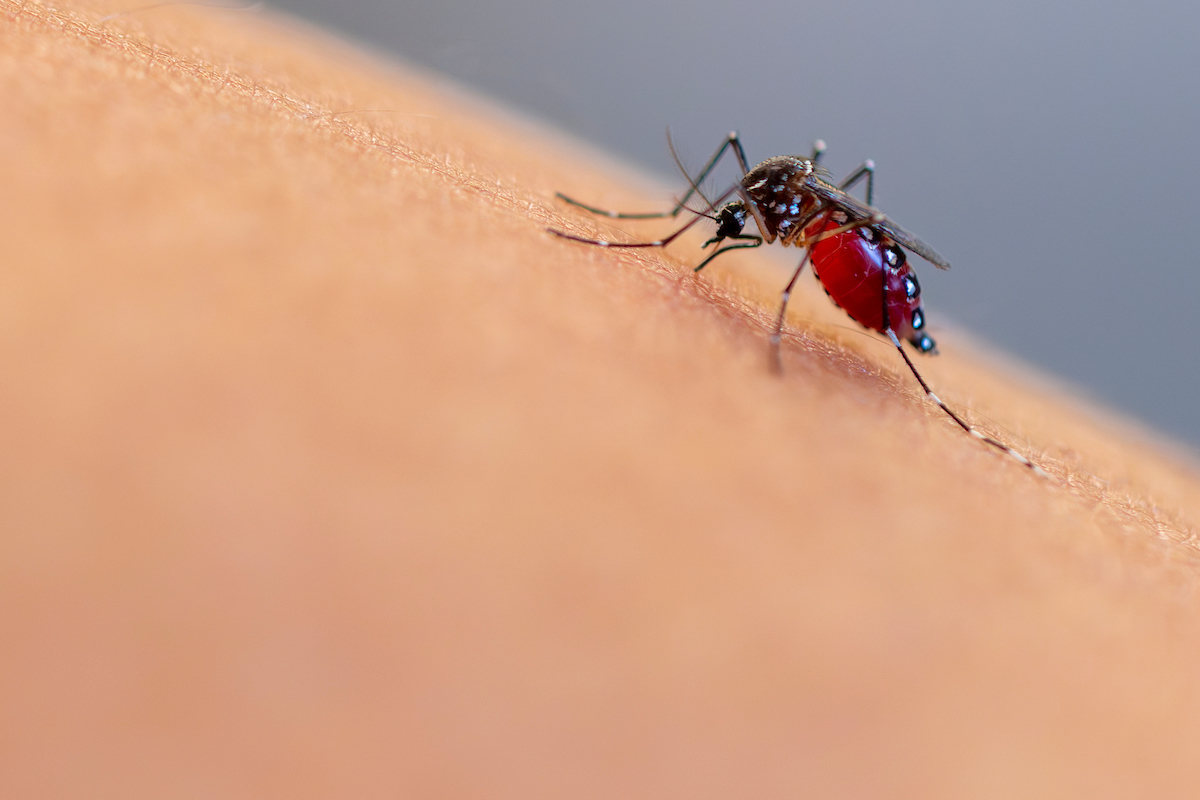To spray for mosquitoes yourself, use a hose-end or pump garden sprayer around doorways to reduce their entry risk. These sprayers are affordable and readily available.
While DIY treatments are cost-effective, professional applications may offer better efficacy against mosquitoes. Consider the advantages and disadvantages before deciding on the best approach for mosquito control in your yard. With the right technique and products, you can effectively manage mosquito populations and create a more enjoyable outdoor environment.
Remember to follow safety precautions and instructions when applying mosquito sprays to protect yourself and the environment. By taking proactive measures, you can effectively combat mosquitoes and enjoy your outdoor spaces without unwanted pests.

Credit: escambia.floridahealth.gov
Introduction To Diy Mosquito Control
Take control of pesky mosquitoes with DIY mosquito control. Learn how to effectively spray for mosquitoes yourself using affordable and readily available equipment and products. By targeting areas where mosquitoes breed and congregate, you can create a more comfortable outdoor environment for yourself and your family.
Mosquitoes are not only a nuisance but also carriers of dangerous diseases. If you’re tired of these pesky insects invading your outdoor space, it’s time to take matters into your own hands and learn how to spray for mosquitoes yourself. DIY mosquito control is a cost-effective and efficient way to protect yourself and your loved ones from the bites and potential health risks associated with mosquitoes.
Why Choose Diy?
When it comes to mosquito control, there are several reasons why choosing the DIY approach can be beneficial:
- Cost-effective: Hiring professional pest control services can be expensive. By doing it yourself, you can save money while still achieving effective mosquito control.
- Convenience: You have the flexibility to spray your yard whenever it’s convenient for you, without having to wait for appointments or rely on someone else’s schedule.
- Customization: DIY mosquito control allows you to tailor the treatment to your specific needs and target areas that are most prone to mosquito infestation.
- Empowerment: Taking control of mosquito control in your own hands gives you a sense of empowerment and satisfaction in maintaining a mosquito-free environment.
Safety First: Understanding Ppe
Prior to starting any DIY mosquito control activities, it’s crucial to prioritize safety. Understanding and using personal protective equipment (PPE) is essential to protect yourself from potential exposure to chemicals. Here are some key considerations:
- Protective Clothing: Wear long sleeves, long pants, socks, and closed-toe shoes to minimize exposed skin.
- Gloves: Use chemical-resistant gloves to protect your hands from direct contact with mosquito control products.
- Eye Protection: Safety goggles or glasses should be worn to shield your eyes from any potential splashes or sprays.
- Respiratory Protection: Depending on the type of mosquito control product you use, a respirator or face mask may be necessary to prevent inhalation of harmful fumes or particles.
Always read and follow the instructions and safety precautions provided by the manufacturer of the mosquito control products you choose to ensure proper usage and protection.
Choosing The Right Chemicals
To effectively spray for mosquitoes yourself, choose the right chemicals carefully. Opt for mosquito killer sprays like Talstar, Demand CS, or BioAdvanced Complete Insect Control for safe and efficient results. Ensure to use proper protective gear and follow instructions for best outcomes in mosquito control.
Natural Vs. Chemical Repellents
When considering mosquito sprays, understanding the difference between natural and chemical repellents is crucial. Natural repellents are derived from plant-based oils, while chemical repellents contain synthetic compounds.Top Diy Mosquito Spray Options
For effective mosquito control, several DIY spray options are available. These include products like Talstar, Demand CS, and Techo Pro, which are commonly used for mosquito eradication.When selecting chemicals for mosquito spraying, it’s essential to prioritize effectiveness and safety. Look for products containing Bifenthrin or BioAdvanced Complete Insect Control, as they are known for their potency against mosquitoes.Consider the ingredients carefully, ensuring they are safe for pets, pollinators, and aquatic life. Mosquito Juice is a popular option known for its effectiveness while being environmentally friendly.To ensure proper application, mix the product according to the instructions provided. Utilize hose-end or pump garden sprayers for efficient and uniform coverage of your yard.When spraying around your house, focus on areas like doorways to minimize the risk of mosquitoes entering your home. BioAdvanced Complete Insect Control is a reliable choice for creating a mosquito-free environment.Investing in quality chemicals is key to successful mosquito control. Talstar and Demand CS are trusted brands known for their effectiveness in eliminating mosquitoes and other pests.Remember to follow safety protocols and wear appropriate personal protective equipment when handling and applying mosquito sprays. By choosing the right chemicals, you can effectively combat mosquitoes and create a comfortable outdoor space for you and your family.Equipment Essentials
When it comes to spraying for mosquitoes yourself, having the right equipment is crucial for effective and efficient mosquito control. Equipment essentials range from selecting the best sprayer to proper maintenance and care to ensure longevity. Let’s delve into the essential equipment needed for successful mosquito spraying.
Selecting The Best Sprayer
Choosing the right sprayer is paramount for achieving optimal results when spraying for mosquitoes. Whether you opt for a hose-end or pump garden sprayer, selecting a sprayer with a fine mist setting can help disperse the mosquito control solution evenly across your yard.
Maintenance And Care For Longevity
Proper maintenance and care of your sprayer are essential for ensuring its longevity and continued effectiveness. Regularly cleaning the sprayer after each use and storing it in a cool, dry place can prevent clogs and corrosion, extending the lifespan of your equipment.
Preparation And Mixing
Spraying for mosquitoes yourself can be an effective way to control these pests. By choosing the right chemical and sprayer, and following proper safety precautions, you can easily spray your yard to keep mosquitoes away without harming pollinators. Protect yourself from mosquito bites and create a mosquito-free environment with DIY mosquito control techniques.
Before you start spraying for mosquitoes in your yard, it’s essential to properly prepare and mix the necessary ingredients. This step ensures that you achieve maximum effectiveness in your mosquito control efforts. In this section, we will provide you with some tips on measuring and mixing the mosquito spray, as well as safety measures to follow during the preparation process.
Measuring And Mixing Tips
Accurate measurement and proper mixing of the mosquito spray ingredients are crucial to ensure the effectiveness of your treatment. Here are some tips to help you get it right:
- Follow the instructions provided on the product label for the correct measurements of the mosquito spray concentrate and water.
- Use a clean, calibrated measuring container to ensure accurate measurements.
- Pour the recommended amount of water into your sprayer tank before adding the mosquito spray concentrate.
- Add the mosquito spray concentrate slowly and carefully to the water in the sprayer tank.
- Stir the mixture gently to ensure thorough mixing of the concentrate with the water.
- Refer to the product label for any specific instructions on mixing or shaking the spray solution.
Safety Measures During Preparation
When preparing the mosquito spray, it’s important to prioritize your safety. Here are some safety measures to keep in mind:
- Wear appropriate personal protective equipment (PPE) such as gloves, long-sleeved shirts, long pants, and closed-toe shoes to protect your skin from potential exposure to the mosquito spray.
- Work in a well-ventilated area to minimize inhalation of the spray solution.
- Avoid smoking, eating, or drinking while handling the mosquito spray concentrate.
- Keep children and pets away from the preparation area to prevent accidental exposure.
- Read and follow all safety instructions provided on the product label.
By following these measuring and mixing tips and adhering to the safety measures during preparation, you can ensure that your mosquito spray solution is properly prepared and ready to use. In the next section, we will guide you on how to effectively spray your yard for mosquitoes.
Spray Application Techniques
To effectively spray for mosquitoes yourself, use hose-end or pump garden sprayers to treat your yard and doorways. Professional applications can be more effective but DIY treatments are cost-effective. Apply insect repellent sparingly to exposed skin, avoiding contact with eyes and mouth.
Effective Yard Coverage
Spraying around doorways can reduce the risk of mosquitoes entering the home. Hose-end and pump garden sprayers are inexpensive and easily purchased at most garden centers.Target Areas: Where To Focus
Focus on areas where mosquitoes breed and rest, such as bushes, tall grass, and standing water. Spray under decks, in shady spots, and around outdoor seating areas.When spraying for mosquitoes yourself, it’s essential to ensure effective yard coverage. Target areas where mosquitoes breed and rest to maximize the impact of the spray. Focus on bushes, tall grass, standing water, and other potential breeding grounds. Additionally, pay attention to areas like under decks, in shady spots, and around outdoor seating areas, as these are common resting spots for mosquitoes. By covering these target areas thoroughly, you can create a more mosquito-free environment in your yard.
Credit: www.nwf.org
Post-spray Cleanup
Once you have completed the mosquito spraying process, it is crucial to perform a thorough post-spray cleanup to ensure the safety of your environment and to maintain the effectiveness of the treatment.
Cleaning Your Equipment
After spraying, clean your equipment immediately to prevent chemical build-up and ensure its longevity. Here’s a simple step-by-step guide:
- Dispose of any remaining chemical solution as per the manufacturer’s instructions.
- Thoroughly rinse the sprayer tank, nozzles, and hoses with water.
- For residual chemical removal, triple rinse the equipment with a cleaning solution, such as water mixed with liquid dish soap.
- Finally, rinse the equipment with clean water and allow it to air dry completely before storing it.
Proper Disposal Of Leftover Chemicals
Proper disposal of leftover chemicals is essential for environmental safety. Here are the recommended steps to dispose of the chemicals responsibly:
- Refer to the product label or manufacturer’s guidelines for specific disposal instructions.
- Do not pour leftover chemicals down the drain or into water sources.
- Consult local waste management authorities to determine the appropriate disposal methods or hazardous waste collection sites in your area.
- Store any remaining chemicals in their original containers, and keep them in a secure location away from children and pets until disposal.
Monitoring And Maintenance
To effectively spray for mosquitoes yourself, consider using hose-end or pump garden sprayers for easy application. Focus on areas like doorways to prevent them from entering your home. While professional treatments may be pricier, DIY methods can also be effective in mosquito control.
Assessing Effectiveness
After spraying for mosquitoes, it is important to assess the effectiveness of your treatment. One way to do this is to monitor the mosquito population in your yard. Look for signs of mosquito activity such as bites or swarms, and take note of any areas where mosquitoes seem to be more prevalent. You can also use mosquito traps to monitor the population and determine if your treatment has been successful.
Scheduling Regular Treatments
Mosquitoes can quickly repopulate an area, so it is important to schedule regular treatments to keep them under control. The frequency of treatments will depend on a number of factors, including the size of your yard, the severity of the mosquito problem, and the type of treatment you are using. Be sure to read the label on your insecticide to determine the appropriate frequency of application.
Maintenance
Maintaining your yard can also help reduce the mosquito population. Mosquitoes breed in standing water, so be sure to eliminate any sources of standing water in your yard, such as empty flower pots or bird baths. Keep your lawn trimmed and remove any debris that could hold water. Additionally, consider using mosquito-repelling plants like citronella or lavender to help keep mosquitoes at bay.
Environmental Considerations
Spraying for mosquitoes yourself is a cost-effective way to protect your home and yard. By using hose-end or pump garden sprayers, you can target areas like doorways to reduce the risk of mosquitoes entering your home. While professional applications may be more effective, DIY treatments can still be a viable option.
Remember to follow safety guidelines and avoid spraying near your eyes and mouth.
Environmental ConsiderationsWhen it comes to mosquito control, it’s important to consider the impact on the environment. Many mosquito control products contain harmful chemicals that can harm beneficial insects like pollinators and wildlife. Therefore, it’s important to take measures to protect these important species while still effectively controlling mosquito populations.Protecting Pollinators and WildlifePollinators like bees and butterflies play a crucial role in our ecosystem, and it’s important to protect them from harmful chemicals. When choosing mosquito control products, look for those that are labeled as safe for pollinators. Additionally, avoid spraying during times when pollinators are most active, such as during the day when bees are out foraging.Choosing Eco-Friendly ProductsEco-friendly mosquito control products are a great alternative to traditional chemical sprays. These products use natural ingredients like essential oils to repel mosquitoes without harming the environment. Look for products that are labeled as eco-friendly or organic to ensure that you’re making the best choice for the environment.In conclusion, protecting the environment while controlling mosquito populations is crucial. By taking steps to protect pollinators and choosing eco-friendly products, you can effectively control mosquitoes without harming the environment. Remember to always read labels carefully and follow instructions closely to ensure the safest and most effective use of mosquito control products.
Credit: agrilifetoday.tamu.edu
Frequently Asked Questions
Can I Spray My Yard For Mosquitoes Myself?
Yes, you can spray your yard for mosquitoes yourself using hose-end or pump garden sprayers. It’s cost-effective but may be less effective than professional treatments. Spraying around doorways can reduce the risk of mosquitoes entering your home.
What Is The Best Diy Mosquito Spray?
The best DIY mosquito spray can be made using ingredients like lemon eucalyptus oil, citronella oil, and witch hazel. Mix these ingredients in a spray bottle and apply it to your skin or outdoor areas to repel mosquitoes. Avoid harmful chemicals and protect beneficial insects by using natural ingredients.
Can You Spray Mosquito Repellent On Yourself?
Yes, you can spray mosquito repellent on yourself. Apply to the palm first and then on face and ears, avoiding eyes and mouth.
Conclusion
Spraying for mosquitoes yourself can be an effective and cost-efficient method for controlling these pesky insects. By choosing the right chemicals and equipment, and taking proper safety precautions, you can protect yourself and your family from mosquito bites. It’s important to remember to avoid harming beneficial insects and to follow instructions carefully.
With these tips in mind, you can enjoy a mosquito-free yard and outdoor activities without the need for professional pest control services.
Related posts:

I’m MD Tanvir, and I bring years of expertise gained from working closely with pest control companies to the forefront. My journey in the industry has inspired me to launch Bug Battler, a platform aimed at equipping people with the know-how to combat pests autonomously. Through Bug Battler, I aim to empower individuals with practical insights to tackle pest infestations effectively.

